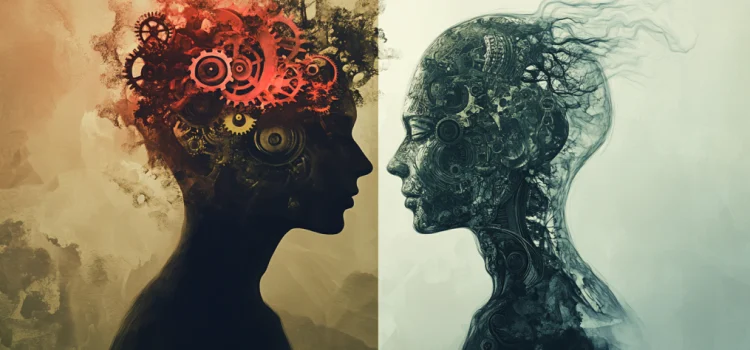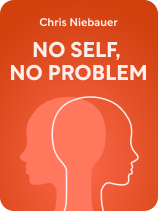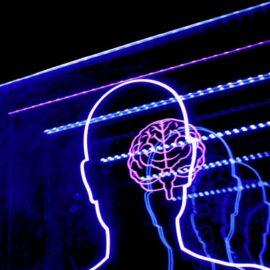

This article is an excerpt from the Shortform book guide to "No Self, No Problem" by Chris Niebauer. Shortform has the world's best summaries and analyses of books you should be reading.
Like this article? Sign up for a free trial here.
Is your sense of self real, or is it just an illusion? How does your cultural background shape your perception of who you are?
In his book No Self, No Problem, Chris Niebauer explores the concept of the self in Western and Eastern thought. He compares the contrasting views of the self and their implications for our understanding of consciousness and identity.
Keep reading to discover how different cultures approach the idea of self and what modern science has to say about it.
The Self in Western and Eastern Thought
Your sense of self (and your ideas about how real and persistent that “self” really is) make up a fundamental part of how you see the world. You don’t come up with these ideas in a vacuum: Niebauer explains that you learn them from the culture you’re raised in. We’ll compare the Western idea of the self to the Eastern idea of the self, as Niebauer explains them, and consider what it might mean to find a compromise between these two worldviews in your perception of yourself.
(Shortform note: One way social scientists like Niebauer explain the differences between Western and Eastern cultures is by characterizing them as “individualistic” or “collectivistic.” Individualist cultures, like those of the US, Canada, and Australia, value personal goals, individual rights, and personal independence. Collectivist cultures, like those of China, Japan, and Korea, emphasize social harmony, community welfare, and interdependence. The culture of the place where people live plays an important role in shaping their identity, as Niebauer notes. But some experts say the traits that cultures influence are more nuanced than a simple binary: Both Eastern and Western cultures can foster a mix of independence and interdependence.)
In the West, People Believe in a Self That Thinks and Acts
Niebauer states Western philosophy makes some foundational assumptions about the self: People raised in the West learn that the self is real, it’s continuous over time, and it’s the “doer” behind our thoughts, feelings, decisions, and actions. In the West, thinking is considered a central part of the self. Niebauer says most people in the West implicitly assume that the self is the part of the mind engaged in explaining our experiences and narrating our thoughts. For centuries, Western philosophy has linked the act of thinking to our very being: We know we exist precisely because we can think (and notice ourselves thinking). This means that in the West, having a self who thinks, judges, and decides is considered a vital part of being human.
Along with the idea of the thinking self goes the idea that the self also persists, seemingly unchanged, over time. Niebauer points out that you perceive yourself as the same person day in and day out, with a consistent set of values and inclinations and a distinct personality. In other words, you feel you’re the same person today as you were yesterday—and the day before that, and the day before that.
Throughout the book, Niebauer contends that the Western sense of the self as real is deceptive—but he acknowledges it’s hard to fathom the idea of existing without a self. That’s in part because your sense of self feels inextricably linked to your sense of agency, and it seems to drive your decisions. Because of your perception that the self is in the driver’s seat and doing the navigating, you can think about drinking your morning espresso or writing a report at work and feel certain it’s “you” who did those things. (If not you, then who was it?)
In the East, People Learn to Regard the Self as Just an Illusion
Unlike people raised in the West, people who view the world through the lens of Eastern schools of thought—like Buddhism, Taoism, or the Advaita Vedanta school of Hinduism—learn a very different concept of the self. Niebauer explains these schools of thought teach that the self is only an illusion: an impermanent idea we have to loosen our grip on if we want to see reality as it actually is.
According to several schools of Eastern thought, you don’t really have a self that exists in any real sense because the self as you perceive it is just a product of your thoughts. Niebauer explains that this means the self isn’t really the “thinker” you feel it is. Your thoughts appear in your consciousness, and you think your “self” produces or directs them. But it’s actually the other way around, and your sense of self comes from your thoughts. In other words, the self is no more real or durable than the thoughts that you think and forget from moment to moment. Niebauer explains that, to Eastern ways of thinking, holding onto the illusion of the self obscures more lucid ways of perceiving who you are and what you experience in the world.
A Buddhist teaching that Niebauer characterizes as crucial to the Eastern idea of the self is a concept called anatta, or “no self.” Niebauer explains that anatta means we have no permanent self, and the self only exists when we’re thinking about it. Buddhists contend that a belief in a stable self is not only erroneous but also leads to all of the suffering we experience in our lives. That’s because it makes us feel invested in thoughts, feelings, and judgments, which are all just temporary.
Is It Possible to Reconcile These Two Worldviews?
The concept that the self isn’t real might be difficult to wrap your head around. But according to Niebauer, this idea is increasingly finding support in research where neuroscientists explore how the brain perceives reality and how its two halves work together to create your unique interpretation of the world.
Niebauer explains that once you understand how your brain creates the illusion of the self (and why this illusion is so convincing), then you can work to look beyond it. Learning to loosen your grip on your sense of self doesn’t require you to make radical changes, like completely letting go of your sense of self or living your life like a Buddhist monk. Instead, Niebauer says you can just learn to take your “self” less seriously, finding something of a compromise between the Western and Eastern ideas of the self.
| Does Brain Research Say the Self Isn’t Real? Some experts disagree with Niebauer’s point of view that scientific research suggests the self is an illusion. Neuroscientist Bobby Azarian, author of The Romance of Reality, points out that skepticism about the existence of the self emerged long before neuroscience arrived. For instance, 18th-century philosopher David Hume stated we have no fixed self that persists over time. Instead, he contended, we have an ever-changing array of perceptions. This idea laid the foundation for the modern argument that our sense of self reduces down to processes happening in the brain, as some neuroscientists contend. But Azarian says new theories of consciousness offer interpretations—like the “loop hypothesis”—as alternatives. The loop hypothesis suggests that consciousness arises from feedback loops of electrical signals sent between various regions of the brain as they communicate with one another. When your brain processes information, brain cells called neurons don’t just pass that information forward: They also create “loops” of activity, where they pass information backward to earlier stages of processing, too. The loop hypothesis suggests that this constant repeating and re-evaluating of information—which is a key part of how the brain processes information—enables your cognition to reflect on itself, in turn allowing your sense of self to emerge. According to Azarian, this hypothesis is starting to find support in neuroscience studies. To understand what you experience, your brain constructs a “model” of the world with itself at the center. The areas of your brain involved in constructing this model—including the cortical midline structures (CMS) and the default mode network (DMN)—are constantly updating and integrating new information about what you’re doing and who you are. As they do that, they create the same kinds of loops of activity that, according to the loop hypothesis, give rise to your consciousness. Azarian suggests this might mean that while your sense of self can’t be pinpointed in one area of your brain, it’s still a very real phenomenon that arises directly from how your brain processes information and makes sense of what you perceive. |

———End of Preview———
Like what you just read? Read the rest of the world's best book summary and analysis of Chris Niebauer's "No Self, No Problem" at Shortform.
Here's what you'll find in our full No Self, No Problem summary:
- Why everything you know about yourself is wrong
- How science is catching on to what Eastern religions have been teaching for millenia
- How to loosen your grip on the thoughts and judgments that make you dissatisfied with your reality






